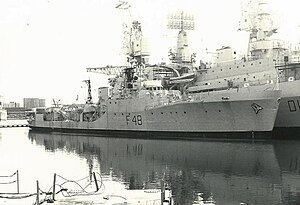HMS Dundas
This article needs additional citations for verification. (February 2013) |
 HMS Dundas, the last active Type 14 "Captain" or "Blackwood" Class anti-submarine frigate at Portsmouth Navy Days, August 1980 | |
| History | |
|---|---|
| Name | HMS Dundas |
| Namesake | James Whitley Deans Dundas |
| Builder | JS White and Co Ltd, Cowes |
| Laid down | 17 October 1952 |
| Launched | 25 September 1953 |
| Acquired | March 1956 |
| Commissioned | 16 March 1956 |
| Identification | Pennant number: F48 |
| Fate | Broken up 1983 |
| General characteristics | |
| Class and type | Blackwood-class frigate |
| Displacement | 1,456 tons (1,479 tonnes) full load |
| Length | 310 ft (94 m) |
| Beam | 33 ft (10 m) |
| Draught | 15 ft (4.6 m) |
| Propulsion |
|
| Speed | 27 knots (50 km/h) |
| Range | 5,200 nautical miles (9,630 km) at 12 knots (22 km/h) |
| Complement | 112 |
| Sensors and processing systems |
|
| Armament |
|
HMS Dundas was a Blackwood-class anti-submarine warfare frigate of the Royal Navy.[1]
Orders and delivery
[edit]The Blackwood-class frigates were first ordered in 1951, with Dundas being the first to be commissioned, on 9 March 1956.[2] They were considered to be of limited usage, and best kept for anti-submarine warfare (ASW) duties. Twelve were delivered in total. Dundas was built by JS White and Co Ltd, at Cowes.
Specifications
[edit]Dundas had a crew of 140, a displacement of 1,180 tonnes when empty and 1,535 tonnes when full. She was 310 ft (94 m) long, 33 ft (10 m) on the beam and had a draught of 15 ft (4.6 m). She was powered by a Parsons or English Electric geared steam turbine, with two Babcock & Wilcox boilers giving 15,000 shp (11 MW) and a speed of 25 knots (46 km/h). Her armament included two Mk.NC 10 Limbo 3-barreled ASW mortars and two 21-inch (533 mm) torpedo tubes in twin mounts. She was also equipped with sonar and radar.[3]
Service
[edit]Dundas appeared in the Ava Gardner film The Little Hut in 1957. Brief footage of the Dundas at sea also appeared in the 1964 Look at Life episode entitled The Price of Valour.
In 1966 Dundas was part of the 2nd Frigate Squadron, based at Portland and used for anti-submarine training. In that year she was present at Portsmouth Navy Days.[4] She subsequently completed a 14-month refit at Gibraltar Dockyard and re-commissioned on 21 June 1968. In the same year she took part in Navy Days at Portsmouth Dockyard.[5]
In 1970 she was present at Portsmouth Navy Days, at the time she had just completed a refit in Gibraltar and was still part of the Second Frigate Squadron to help train officers and men in Anti-Submarine Warfare at Portland.[6]
Dundas attended the 1977 Silver Jubilee Fleet Review off Spithead when she was part of the 2nd Frigate Squadron.[7]
Decommissioning and disposal
[edit]A unrepairable propeller shaft knock was discovered when she sailed from Portsmouth, after a brief spell in dry dock she was moved to Chatham dockyard where the entire crew transferred to her sister ship HMS Hardy taking with them anything useful for spares and crew comfort.[citation needed] Dundas was eventually scrapped in Troon in April 1983.[8]
References
[edit]- ^ "HMS Dundas (1956) FF (2nd)". britainsnavy.co.uk. Retrieved 7 October 2012.
- ^ "Unit History: HMS Dundas". forces-war-records.co.uk. Retrieved 7 October 2012.
- ^ "Blackwood Class (Type 14)". hazegray.org. Retrieved 7 October 2012.
- ^ Programme, Navy Days at Portsmouth 27–29 August 1966, HMSO p.17
- ^ Programme, Navy Days at Portsmouth August 31st-September 2nd 1968, p. 19.
- ^ Programme, Navy Days Portsmouth, 29th-31st August 1970, p. 19.
- ^ Official Souvenir Programme, 1977. Silver Jubilee Fleet Review, HMSO
- ^ "Blackwood Class Frigates". worldnavalships.com. Retrieved 7 October 2012.
Publications
[edit]- Colledge, J. J.; Warlow, Ben (2006) [1969]. Ships of the Royal Navy: The Complete Record of all Fighting Ships of the Royal Navy (Rev. ed.). London: Chatham Publishing. ISBN 978-1-86176-281-8.
- Marriott, Leo (1983). Royal Navy Frigates 1945-1983. Ian Allan Ltd. ISBN 07110 1322 5.


 French
French Deutsch
Deutsch